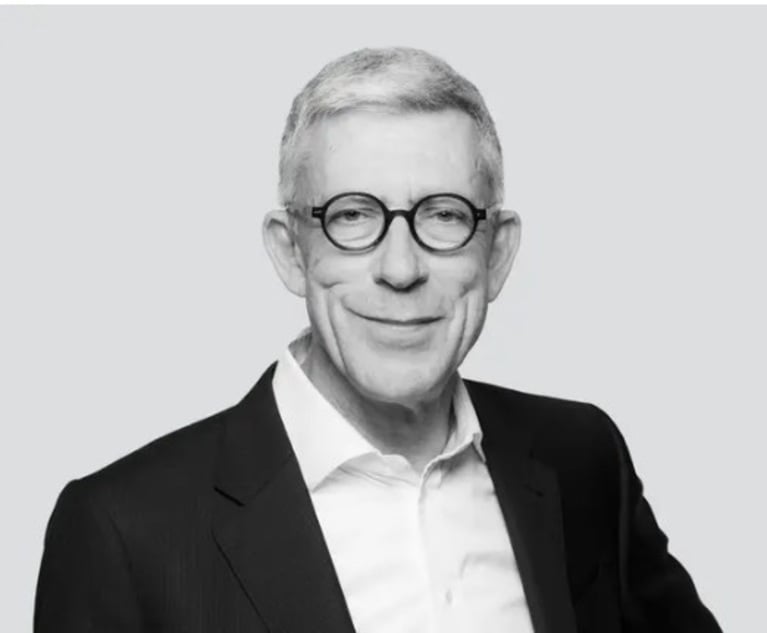 Credit: dizain/Adobe Stock
Credit: dizain/Adobe StockHSF's American Dream: What Will a U.S. Merger Mean For its Asia Practice?
Last year, HSF announced the closures of its Seoul and Kuala Lumpur offices. It has also recently rejigged its Singapore offerings and cut some Hong Kong staff. How much of that was so it would sit pretty for an American suitor?
November 13, 2024 at 07:52 AM
5 minute read
Law firm mergers happen in good times and bad.
That was my first thought when Herbert Smith Freehills announced its landmark merger agreement with New York firm Kramer Levin Naftalis & Frankel. It’s not a done deal, as it’s still subject to partner voting. But so far, reception has been quite warm, despite the announcement lacking in A&O Shearman’s fanfare with fancy websites and slick marketing.
I remember distinctly when legacy Herbert Smith was chasing tails in the Southern Hemisphere. In 2012, it merged with leading Australian firm Freehills—I had a bit of a front-row seat to that combination, having been employed by the joint entity as its communications manager months after the two firms wedded.
Australian firms were all the rage back then, particularly for global players that had huge China plays and ambitious China strategies. It was the early 2010s—a time when Chinese state-owned enterprises were empowered by Beijing’s “Go Abroad” policy, looking to invest billions of dollars into energy and natural resources assets. That became a key driver for most of the Australian combinations back then. Linklaters had a thing with Allens, Ashurst combined with Blake Dawson, and King & Wood became the first Chinese firm to merge with a foreign practice.
Back then, being able to tout a seamless Asia-Pacific practice was a distinguishing factor for big law firms. It made firms cool and important, and HSF successfully sold itself that way for years.
But that phenomenon didn't last. Things began to change after China started cracking down on corruption and all the big billion-dollar buys fizzled. The APAC playbook went back to becoming just plain old Asia and Australasia. It never did quite take off again—not in the same way.
Now, the viability of law firm business has shifted. HSF, like many of its U.K. counterparts, set off to fulfill its American dream.
One source told Law.com International that a U.S. merger has been a top mandate for HSF’s management this year. Another said, “they’ve been talking about doing something for years.”
It’s not hard to see why the firm feels the need to push into the U.S., even if a Trump era may herald more volatile times.
Some lawyers I spoke to said that Trump’s nationalist, "America First" stance may lead to a boom in the U.S. economy, but only on its own terms, with little reliance on countries beyond its borders—especially China. So, the timing for a U.S. play is “quite crucially now,” one Hong Kong-based U.S. law firm partner said.
But what will this bold push mean for HSF’s Asia practice, where it counts seven offices—in Bangkok, Beijing, Shanghai, Singapore, Tokyo, Jakarta and Hong Kong?
To be sure, a merger with Kramer Levin would be more of a plug-and-play compared to A&O Shearman's massive feat, which has already pushed forward with layoffs and office and business unit closures. Kramer Levin has just 330 lawyers in five offices, one of which is in Paris, where HSF also has an office that recently celebrated its 60th anniversary. Kramer Levin's Paris office will be spun off and excluded from the merger.
In terms of footprint in Asia, Kramer Levin has much to gain without messy integration issues. According to HSF’s website, the firm has over 270 lawyers in Asia, although some who are notably experienced in Asian deals and matters are based in offices outside of the region.
About 120 of those lawyers are dispute resolution experts. That's worth noting since both the Hong Kong International Arbitration Centre and Singapore International Arbitration Centre’s latest statistics show that U.S. parties have consistently been their top users. HSF is well known as a dominant player in the international arbitration space in Asia.
But one HSF source said that, internally, the firm's U.S. merger is considered more of an “M&A play,” much like the Freehills merger was 12 years ago.
In Asia, HSF has also thrived by building local alliances. In mainland China, it operates a joint operation with domestic practice Kewei Law Firm, which has 12 lawyers, half of whom are partners. In Jakarta, it has a long-standing association with domestic firm Hiswara Bunjamin & Tandjung. And in Singapore, it has a Formal Law Alliance with local practice Prolegis.
Singapore is HSF’s second-largest office. (Its largest is Hong Kong, where it counts just over 100 lawyers). Singapore is also where the firm has spent recent months rejigging its offerings. It did away with its aviation practice, which resulted in the departures of several partners this year. Last year, it added a private capital capability and also launched a litigation practice at Prolegis. A few months ago, it decided to double down on its energy practice by hiring from King & Spalding and White & Case.
Sources at HSF told Law.com International that the firm had been making moves so it would be more palatable to potential merger partners. This year it has been shedding team members in Hong Kong, including dispute practice associates and business development and marketing professionals, sources say. And in recent months it shuttered two Asian offices—Seoul and Kuala Lumpur.
One remaining question about the merger revolves around the two firms' mismatched profit per equity partner (PEP). Kramer Levin’s 60 equity partners take home about $2.4 million in profits each year, while HSF’s estimated 300 equity partners draw $1.6 million.
Maybe, despite the American fixation with profits, it’s not always about toe-to-toe PEP.
NOT FOR REPRINT
© 2025 ALM Global, LLC, All Rights Reserved. Request academic re-use from www.copyright.com. All other uses, submit a request to [email protected]. For more information visit Asset & Logo Licensing.
Related Stories
View AllYou Might Like
View All

'Taking the Best' of Both Firms, Ballard Spahr and Lane Powell Officially Merge
6 minute read

New Year, New Am Law 100: Challenges Await These Newly Merged Law Firms
7 minute readTrending Stories
- 1CLOs Face Mounting Pressure As Risks Mushroom and Job Duties Expand
- 2X Faces Intense Scrutiny as EU Investigation Races to Conclusion & Looming Court Battle
- 3'Nation is in Trouble': NY Lawmakers Advance Bill to Set Parameters for Shielding Juror IDs in Criminal Matters
- 4Margolis Edelstein Broadens Leadership With New Co-Managing Partner
- 5Menendez Asks US Judge for Bond Pending Appeal of Criminal Conviction
Who Got The Work
J. Brugh Lower of Gibbons has entered an appearance for industrial equipment supplier Devco Corporation in a pending trademark infringement lawsuit. The suit, accusing the defendant of selling knock-off Graco products, was filed Dec. 18 in New Jersey District Court by Rivkin Radler on behalf of Graco Inc. and Graco Minnesota. The case, assigned to U.S. District Judge Zahid N. Quraishi, is 3:24-cv-11294, Graco Inc. et al v. Devco Corporation.
Who Got The Work
Rebecca Maller-Stein and Kent A. Yalowitz of Arnold & Porter Kaye Scholer have entered their appearances for Hanaco Venture Capital and its executives, Lior Prosor and David Frankel, in a pending securities lawsuit. The action, filed on Dec. 24 in New York Southern District Court by Zell, Aron & Co. on behalf of Goldeneye Advisors, accuses the defendants of negligently and fraudulently managing the plaintiff's $1 million investment. The case, assigned to U.S. District Judge Vernon S. Broderick, is 1:24-cv-09918, Goldeneye Advisors, LLC v. Hanaco Venture Capital, Ltd. et al.
Who Got The Work
Attorneys from A&O Shearman has stepped in as defense counsel for Toronto-Dominion Bank and other defendants in a pending securities class action. The suit, filed Dec. 11 in New York Southern District Court by Bleichmar Fonti & Auld, accuses the defendants of concealing the bank's 'pervasive' deficiencies in regards to its compliance with the Bank Secrecy Act and the quality of its anti-money laundering controls. The case, assigned to U.S. District Judge Arun Subramanian, is 1:24-cv-09445, Gonzalez v. The Toronto-Dominion Bank et al.
Who Got The Work
Crown Castle International, a Pennsylvania company providing shared communications infrastructure, has turned to Luke D. Wolf of Gordon Rees Scully Mansukhani to fend off a pending breach-of-contract lawsuit. The court action, filed Nov. 25 in Michigan Eastern District Court by Hooper Hathaway PC on behalf of The Town Residences LLC, accuses Crown Castle of failing to transfer approximately $30,000 in utility payments from T-Mobile in breach of a roof-top lease and assignment agreement. The case, assigned to U.S. District Judge Susan K. Declercq, is 2:24-cv-13131, The Town Residences LLC v. T-Mobile US, Inc. et al.
Who Got The Work
Wilfred P. Coronato and Daniel M. Schwartz of McCarter & English have stepped in as defense counsel to Electrolux Home Products Inc. in a pending product liability lawsuit. The court action, filed Nov. 26 in New York Eastern District Court by Poulos Lopiccolo PC and Nagel Rice LLP on behalf of David Stern, alleges that the defendant's refrigerators’ drawers and shelving repeatedly break and fall apart within months after purchase. The case, assigned to U.S. District Judge Joan M. Azrack, is 2:24-cv-08204, Stern v. Electrolux Home Products, Inc.
Featured Firms
Law Offices of Gary Martin Hays & Associates, P.C.
(470) 294-1674
Law Offices of Mark E. Salomone
(857) 444-6468
Smith & Hassler
(713) 739-1250










